As global heating sees a surge in wildfires, we hear from those tackling the blazes, who face injury, death and trauma, often without proper equipment or support
Babis Zacharis
Hellenic fire service volunteer, Athens
In Greece, fires take up a lot of resources. There isn’t enough money to recruit the number of [firefighters] needed or to buy the necessary equipment. Volunteers plug the gaps.
To become a volunteer firefighter with the Greek fire service, I had to do 120 hours of training. Volunteers work in urban environments dealing with accidents and rescues, house fires, factory fires, as well as tackling wildfires. We have to work at least three days a month; I have a full-time job as a civil engineer.
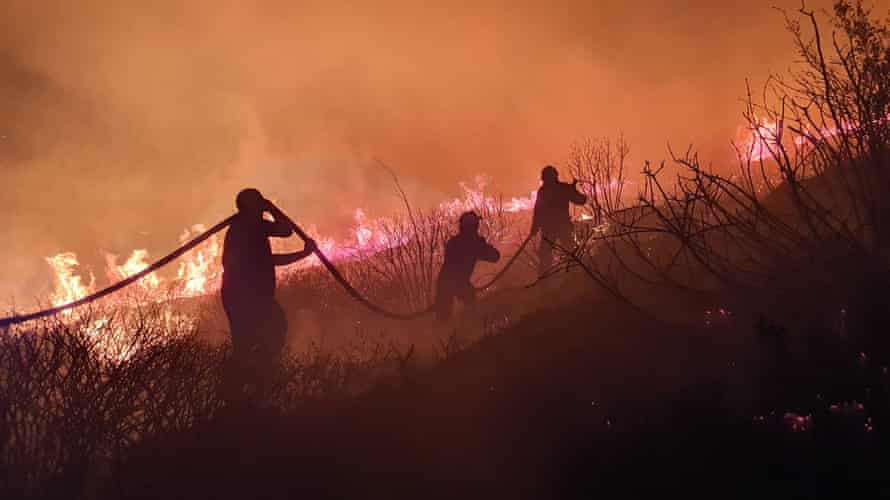
For the past five to six years, wildfires have become the norm in Greece. The last one I was involved in was in early August. Many buildings were burned, a lot of forest was lost and all of Athen’s fire services, and some from other regions of Greece, were called in to help. There were bad wildfires in other parts of the country at the same time.
The work was difficult and emotional. When I saw the fire, my first feeling was anger – I saw it as an enemy. I could not accept that it would destroy something I love. As the blaze grew, sometimes we felt helpless. At one point, we ran out of water and electricity, and had to retreat.
It is also dangerous. One of the volunteer firefighters involved in that fire just died. He suffered burns when the vehicle he was in caught fire. Firefighters have a very strong relationship with each other; we are like a family. We see ourselves in each other. It’s extremely emotional.
Volunteers get paid nothing. The state provides those in the Greek fire service with some equipment but not everything that is needed, so I have bought my own. I’m happy to do this, but not everyone can. Unlike employed firefighters, our families get no compensation if we die in the line of duty.
When a volunteer firefighter with the Greek fire service died last year of a heart attack while responding to a fire, there was a small ceremony and a tweet from the fire service. When someone offers themselves to the public and dies in the line of duty, the least they deserve is proper recognition.
Scott Vinen
Tasmania fire service, Australia
Are bushfires getting worse? I can’t answer with any scientific basis but they’re getting more frequent – the bushfire season tends to start earlier and run for longer. We seem to be having longer dry spells. There’s a lot more public scrutiny on us to do a better job.
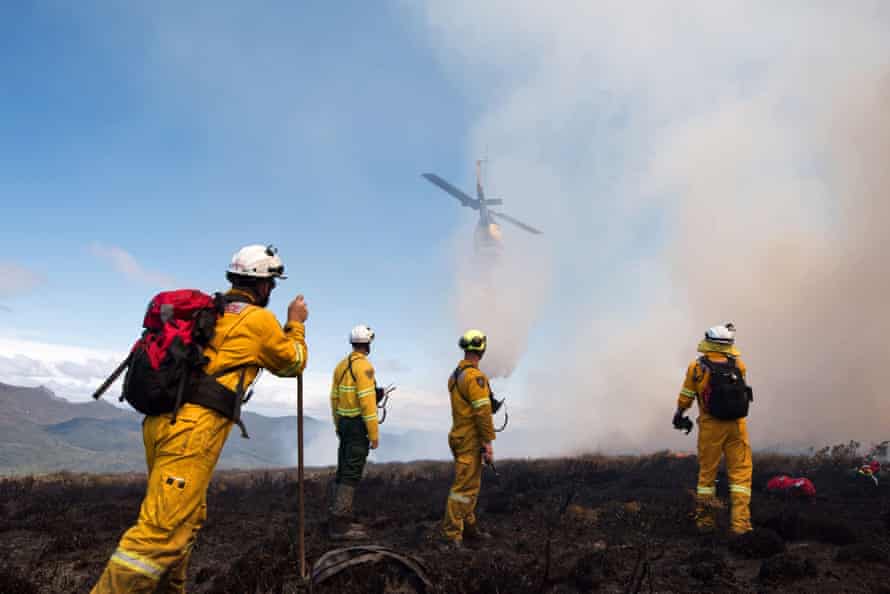
During wildfires, there are trees falling down, you’re out in the bush and in danger. In 2016, I was fighting a fire in a remote location. We had to fly in and out by helicopter. They weren’t able to land so I had to jump out with my backpack, tools, food and water. As I got to the ground, lightning struck a tree and lit up the sky like nothing I’ve seen before.
In 2019, I was in charge of groups tackling a fire near the Great Lake. One of my seconds in command was fighting a fire and a gust of wind meant it went over the top of his head, melted the guideposts and damaged some vehicles. They weren’t hurt, but it was quite scary.
Another time, a helicopter got its bucket caught in a tree and went to ground. Flying conditions are always tough because there’s a lot of smoke and fire creates wind. We had to get the operator out because the fire was all around him.
We’ve just set up a remote rescue capability as part of the remote area firefighting operation. We are gearing up for rescuing our own people and those from other services.
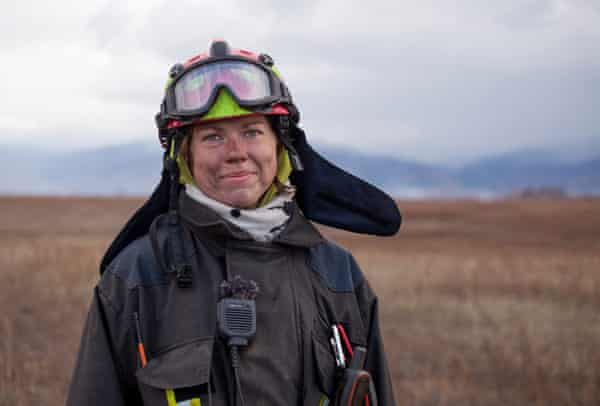
Sonya Kosacheva
Greenpeace, Russia
I discovered a love for firefighting in 2010 when a friend asked if I’d be interested in volunteering. The opportunity also opened my eyes to some huge problems we have in Russia.
There are various services dedicated to fighting fires in cities, forested areas and nature reserves. Our country is huge and there isn’t enough money to provide a firefighting service throughout. There are ‘zones of control‘, which are remote areas with few people living there, where regional authorities do not have to put out fires [if the cost of doing so exceeds that of the fire damage]. This means wildfires get out of control. We saw this in 2019 when smoke from fires burning in Yakutia, Siberia, covered cities thousands of miles away.
As a woman, it’s very hard to work as a professional firefighter in Russia. Until recently, women could work in city fire service support roles but could not work directly with fire – it was believed the work is too dangerous for women. Two years ago, the professional standard of a forest firefighter was modified to include women, but in practice, nothing has changed.
This year was a record year, in terms of the scale of wildfires, after we had abnormal heatwaves in the Arctic region. Many fires are started by people but the climate crisis enables them to spread.
In June, I was called to a fire in the Denezhkin Kamen nature reserve in the Urals. The fire had started due to lightning. The reserve authority realised that the few rangers they had would not be enough to stop it and asked for help from the state aviation service. Sometimes it can take a few days for them to arrive because there’s a lot of bureaucracy and money involved. This time can be critical in terms of managing the fire.
In the meantime, the reserve called us. I had three hours to gather all the stuff I needed before driving 48 hours from Moscow to the reserve. We rotated drivers so we were constantly on the move. When we got there, the fire had spread over 50 hectares [124 acres]. We set up camp and changed into our firefighting clothes.
First, we had to cross a river and then it was a two-hour walk up to an elevation of 600 metres. The aviation service arrived quickly this time and there were about 50 people working on the fire. As the nearest water source was two hours away, we decided to dig a line around the fire to contain it. We worked for 10 days. In the end, about 100 people were involved in putting out the fire.
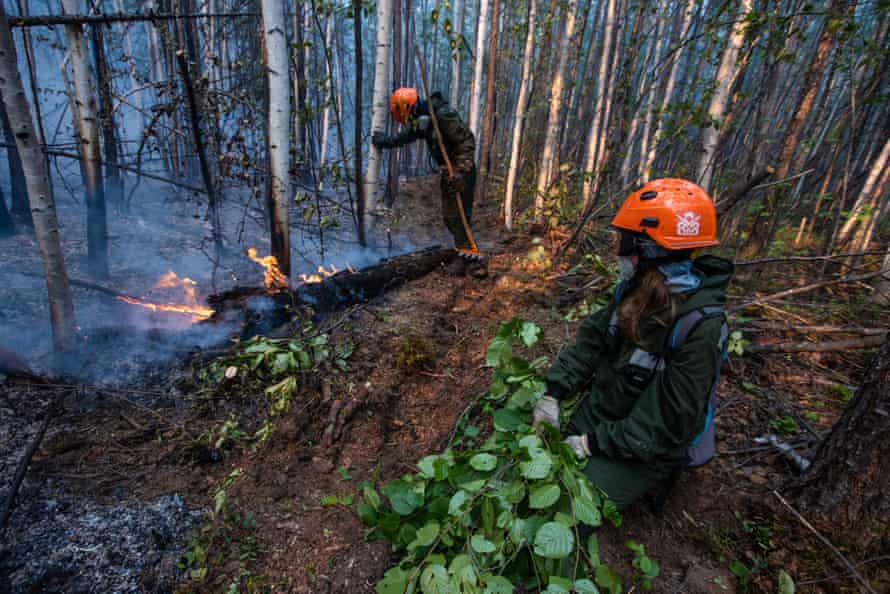
As well as the director of the nature reserve, there were two other women involved. Our male colleagues said to us on quite a few occasions: “Girls, you must be tired. This is a man’s job. Stay at the camp.”
We were all tired and had the same bruises. I and the other woman told them: “You’re also tired from wearing heavy equipment. Why don’t you stay at the camp?”
Tjalle Boorsma
Asociacion Armonia, Bolivia
The worst experience I had still gives me nightmares. It was in 2016; it was intense; we didn’t have the right equipment and we made mistakes. No one got hurt, but most of us were dehydrated with a severe headache for two days afterwards.
I work for a Bolivian organisation focused on protecting the country’s most threatened birds. It owns an 11,000-hectare nature reserve that is home to the critically endangered blue-throated macaw.
I started working on the reserve in 2015 and since day one, fire has been the biggest threat. That year, a fire started on neighbouring land got out of control and burned the whole reserve. We had no system in place to protect against fire and none of us were trained in how to fight fires.
The land surrounding us is used for grazing cattle. The ranchers set fire to grassland the cows refuse to eat hoping it will burn a small area before the rain comes. Often, rain doesn’t arrive or the wind shifts and the fire gets out of control.
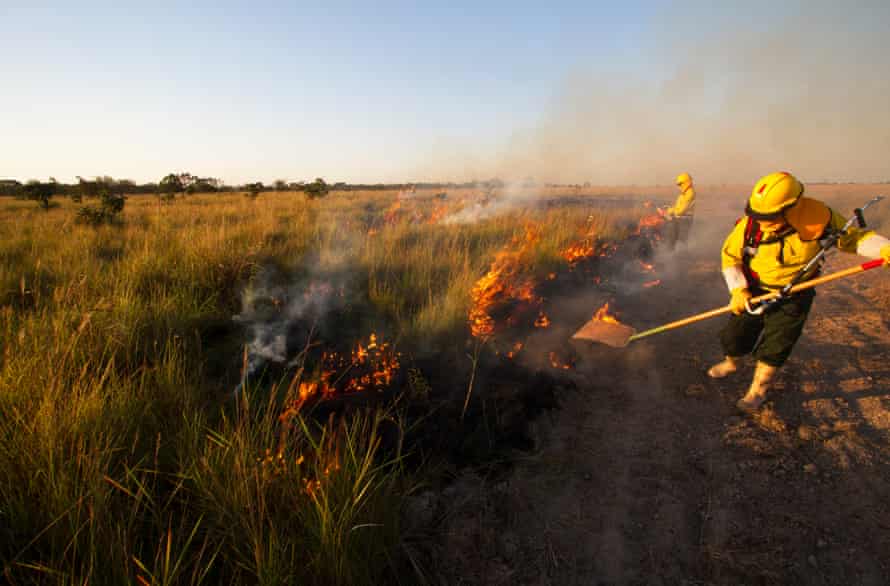
Every year there are weather extremes. We’ve had some intense flooding, followed by a longer dry season. There is a fire service managed by the government but very little funding for conservation and habitat protection. Park rangers and firefighters are often trained by, and receive equipment from, non-governmental organisations. It has been left up to me to work towards a management plan for fire and fundraise to protect the reserve from fire.
Now we create firebreaks by ploughing the ground with a tractor so there is no fuel for any fire. This year we have a 4km-long [2.5 miles] firebreak that is 20 metres wide, and on either side of that we burn a 30-metre to 50-metre section so if a fire reaches it, there’s nothing left to burn and it will go out.
We are well-prepared but I worry when we reach the dry season. It’s always a stressful time.
Anna Mattila
Jokilaaksojen rescue services, Finland
I always knew wildfires were going to be a part of the job as we have a lot of forests in Finland. Ten years ago, I’d maybe tackle two to three each year; now it’s between five and 10. My service has to deal with 20 to 30 every year now.
In July, I was involved in fighting the worst one of my career, and the worst our service has seen for 20 years. The fire in Kalajoki, in a remote area of north-west Finland, destroyed more than 300 hectares. There were 100 firefighters working around the clock for almost two weeks. Firefighters were called back from holidays and off-days, including me.
We had to ask for help from other fire departments. All 22 regional rescue services in Finland helped – from Helsinki to Lapland. I think this is the first time this has happened in Finnish history.
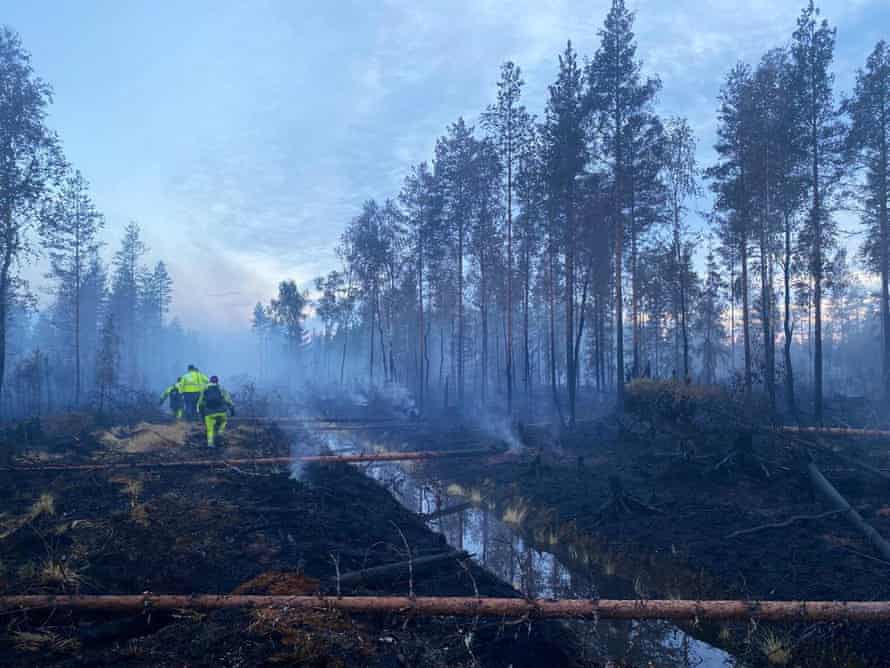
The fire was in the middle of nowhere and we had to use all-terrain vehicles and walk to get to the frontline. When I arrived, trees were burning and toppling over. That was the scariest bit. It was dangerous for the firefighters. Luckily, there were no serious injuries. There were about five helicopters dropping water on the flames.
I worked a 16-hour shift. It was almost 30C [86F] and the terrain was difficult. My eyes stung and watered because of the smoke. But for me, it was more stressful mentally. I was in charge of making sure firefighters weren’t going to get hurt and that they got enough rest, had eaten and that new ones would come to take over.
After that shift, I had to go back to my normal duties before I returned to Kalajoki two weeks later. Life goes on, whether there’s a big fire burning somewhere or not.
